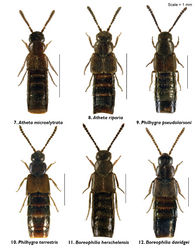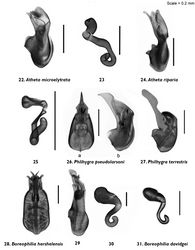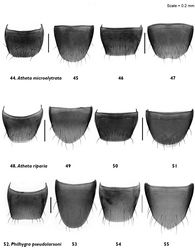Philhygra pseudolarsoni
| Notice: | This page is derived from the original publication listed below, whose author(s) should always be credited. Further contributors may edit and improve the content of this page and, consequently, need to be credited as well (see page history). Any assessment of factual correctness requires a careful review of the original article as well as of subsequent contributions.
If you are uncertain whether your planned contribution is correct or not, we suggest that you use the associated discussion page instead of editing the page directly. This page should be cited as follows (rationale):
Citation formats to copy and paste
BibTeX: @article{Klimaszewski2012ZooKeys186, RIS/ Endnote: TY - JOUR Wikipedia/ Citizendium: <ref name="Klimaszewski2012ZooKeys186">{{Citation See also the citation download page at the journal. |
Ordo: Coleoptera
Familia: Staphylinidae
Genus: Philhygra
Name
Philhygra pseudolarsoni Klimaszewski & Godin sp. n. – Wikispecies link – ZooBank link – Pensoft Profile
Holotype (male)
Canada, Yukon, Whitehorse, Paddy’s Pond, 60.7067, -135.0917, 26.V.2007, 649 m, litter sifting, mixed aspen and white spruce forest, B. Godin (LFC).
Paratypes
same label data as the holotype (ECW) 1 male; Watson Lake, Watson Creek, 60.1272, -128.8053, 4.VI.2007,697 m, deciduous forest soil sifting, B. Godin (ECW) 1 male, 1 female.
Etymology
This species name derives from the specific name larsoni (Philhygra larsoni Klimaszewski and Langor), and the prefix pseudo (false) in relation to the similarity of the two species in external and, to a lesser degree, genitalic morphology.
Diagnosis
Body narrowly subparallel, uniformly black or black with legs and sutural part of elytra reddish-brown (Fig. 9); moderately glossy, with fine, dense punctation and meshed microsculpture on forebody; head round, distinctly narrower than pronotum, with eyes as long as postocular region of head; antennae slender with articles 4–5 elongate, 6–10 subquadrate to slightly transverse; pronotum slightly transverse and almost as wide as elytra; elytra at suture as long as or slightly longer than pronotum; length 2.9–3.0 mm (Fig. 9). MALE: tergite 8 widely arcuate apically (Fig. 52); sternite 8 elongate and rounded apically (Fig. 53); median lobe of aedeagus with apex triangularly produced in lateral view (Fig. 26).
Female. tergite 8 truncate apically (Fig. 54); sternite 8 produced medially (Fig. 55); pygidium with ventral structure weakly sclerotized.
Distribution
This species is known only from Whitehorse and Watson Lake in the Yukon Territory.
Bionomics
. This species was collected in May and June from ground litter.
Comments
Philhygra pseudolarsoni is similar in both external morphology and genitalia to Philhygra larsoni Klimaszewski and Langor. However, it may be distinguished from Philhygra larsoni by the smaller and darker body, quadrate or transverse antennal articles 4–10 and by the median lobe of the aedeagus with a more elongate apical part of the tubus in lateral view.
Original Description
- Klimaszewski, J; Godin, B; Bourdon, C; 2012: Further contributions to the aleocharine fauna of the Yukon Territory, Canada (Coleoptera, Staphylinidae) ZooKeys, 186: 207-237. doi
Images
|


